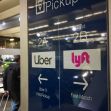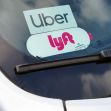Massachusetts is set to be a key arena in the continuing national discussion on whether ride-share drivers should be classified as independent contractors or employees with full employment benefits. The state's Supreme Court is scheduled to hear arguments on two opposing ballot measures that could profoundly change the operational dynamics for companies such as Uber, Lyft, Instacart, and DoorDash.
The industry-backed measure seeks to define app-based drivers as independent contractors, providing them with certain benefits without classifying them as employees. Conversely, a labor-backed proposal advocates for allowing Uber and Lyft drivers to unionize, aiming to secure broader rights and protections typical of employee status.
This judicial review comes ahead of a crucial trial set for May 13, where Uber and Lyft will contend with a 2020 civil lawsuit initiated by then-Attorney General Maura Healey, now the state’s governor. The lawsuit accuses the companies of circumventing state labor laws by misclassifying drivers as independent contractors, thereby avoiding costs associated with minimum wage, overtime, and sick leave. Should the companies fail to win in court or at the ballot box, they could face a dramatic overhaul of their business model in Massachusetts, potentially setting a precedent for other states.
The cost implications of reclassifying gig workers as employees are significant. According to various studies, employees can cost companies up to 30% more than independent contractors. Over a decade, Uber and Lyft reportedly avoided contributing $266.4 million to workers' compensation, unemployment insurance, and paid family medical leave in Massachusetts alone. The outcome of the Massachusetts case could therefore have far-reaching effects not only for the companies involved but also for the structure of the gig economy at large.
The struggle over driver classification is not unique to Massachusetts. In California, a $200 million campaign led by Uber and Lyft in 2020 resulted in a ballot measure that maintained drivers’ contractor status while granting some additional benefits. However, ongoing litigation challenges the measure’s validity. Similar disputes have surfaced in New York, where a recent settlement required Uber and Lyft to establish an earnings floor and offer paid sick leave, mirroring some aspects of the proposed Massachusetts legislation.
As Shannon Liss-Riordan, a prominent attorney involved in gig economy cases, noted, Massachusetts is particularly significant due to its stringent employee protection laws. The state’s decisions could influence broader national policies regarding gig workers and the responsibilities of companies that dominate this sector.
To support their position, companies like Uber and Lyft have contributed millions to the Flexibility and Benefits for Massachusetts Drivers committee, advocating for ballot measures that promise to preserve the flexibility desired by many app-based drivers while enhancing their benefits package. The committee is currently preparing multiple versions of the proposal for the November ballot, emphasizing the importance of securing favorable terms for drivers while maintaining operational flexibility for the companies.






